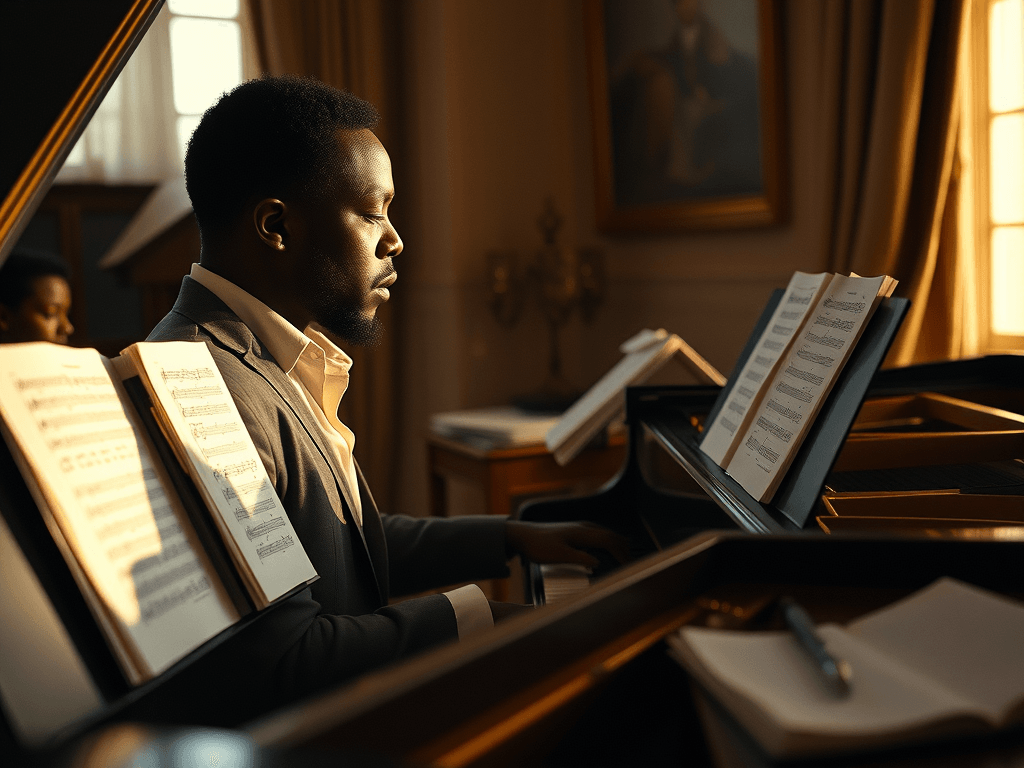Table of Contents
Important Composers of Color Throughout History: Black Composers You Should Know
Throughout the rich and complex history of classical music, Black composers have contributed significantly to shaping the genre. Despite facing systemic barriers and often being overlooked in traditional narratives of music history, these composers brought innovative ideas, blending their cultural backgrounds with Western classical traditions. This article spotlights key Black composers who have left an indelible mark on the world of classical music, offering insight into their achievements, influences, and the unique musical perspectives they introduced to symphonic and orchestral compositions.

Who Are the Most Influential Black Composers in Classical Music?
What Contributions Did They Make to Music History?
Black composers have added immense value to classical music by bringing their unique cultural backgrounds, experiences, and innovations to the genre. Scott Joplin, known as the “King of Ragtime,” is one of the most iconic figures who first gained widespread recognition. His ragtime compositions, particularly “Maple Leaf Rag”, bridged the gap between classical music and popular genres, ultimately influencing the development of jazz.
William Grant Still, another pivotal figure, was a trailblazer in multiple ways: he was the first African American composer to conduct a major U.S. orchestra and the first to have a symphony performed by one. His Afro-American Symphony (1931) was groundbreaking for its fusion of blues, jazz, and spirituals with classical symphonic form. By incorporating African American musical idioms into his compositions, Still created a new musical language that resonated deeply with both Black and white audiences.
Expansion: Beyond Joplin and Still, George Walker was a monumental figure, becoming the first African American to win the Pulitzer Prize for Music in 1996 for his composition Lilacs. His works range from piano sonatas to large orchestral pieces, marked by harmonic complexity and lyrical beauty. Margaret Bonds, a close collaborator of Langston Hughes, combined African American spirituals with classical composition, as seen in her oratorio The Ballad of the Brown King. These composers were instrumental in expanding the classical music canon to include African American cultural narratives.
How Did Their Background Influence Their Compositions?
The personal and cultural backgrounds of Black composers have played a vital role in shaping their music. Many drew from African American spirituals, gospel, and blues traditions, weaving them into symphonic and chamber music forms. Florence Price, for example, was deeply influenced by her Southern upbringing and the music of the African American church. Her Symphony No. 1 in E minor (1933), the first symphony by a Black woman to be performed by a major orchestra, is a stunning blend of traditional European symphonic structure and the rhythms and melodies of Black spirituals.
Similarly, Undine Smith Moore used her compositions to reflect her commitment to African American history and culture. Her choral works, such as Scenes from the Life of a Martyr, which honors Martin Luther King Jr., are powerful testaments to the African American experience, often using spirituals as a foundational element. These composers didn’t just incorporate Black music into classical forms—they expanded what classical music could represent by including the voices and stories of African Americans.
Which Works Are Considered Essential Listening?
Several works by Black composers stand as essential pieces in the classical music canon. Scott Joplin’s “Maple Leaf Rag” is a must-listen, as it laid the groundwork for future American musical innovations. William Grant Still’s Afro-American Symphony remains a cornerstone in classical music, showing the symphonic potential of African American folk and spiritual music.
Florence Price’s Symphony No. 1 in E minor is another key work, representing a milestone not only for its historical significance but for its emotional depth and technical skill. Price’s symphony broke barriers for Black women in the classical world and set the stage for other composers of color to follow. George Walker’s Lyric for Strings, an intensely personal work, is considered one of his most frequently performed pieces, noted for its poignancy and delicate harmonic textures.
Expansion: Other essential works include Margaret Bonds’ Troubled Water, which incorporates spiritual elements into a solo piano work, and Valerie Capers’ Song of the Seasons, which reflects her wide-ranging talent as both a jazz and classical composer.
What Are the Key Achievements of 10 Black Composers?
Who Are the Pioneers Among Black Composers?
Many Black composers were pioneers in breaking the racial and cultural barriers that limited their opportunities. Samuel Coleridge-Taylor (1875–1912), often dubbed the “African Mahler,” achieved international recognition for his cantata Hiawatha’s Wedding Feast, which celebrated African heritage while employing classical forms. His success as a Black composer in early 20th-century England was extraordinary, and he is credited with inspiring future generations of Black musicians.
Duke Ellington, primarily known as a jazz icon, also made contributions to classical music. His orchestral suite Black, Brown, and Beige (1943) performed at Carnegie Hall, stands as a significant work that blends jazz, blues, and classical influences, challenging the boundaries between these genres.
Expansion: More contemporary pioneers include Tyshawn Sorey, a composer and improviser whose genre-defying works challenge traditional boundaries in classical music, and Courtney Bryan, whose compositions explore spirituality, race, and gender through a combination of jazz, gospel, and classical music.
What Awards and Recognitions Have They Received?
The accomplishments of Black composers have been acknowledged through prestigious awards and accolades, though often belatedly. George Walker’s Pulitzer Prize win in 1996 for Lilacs marked a significant milestone, but many other composers, including Adolphus Hailstork, have received major honors. Hailstork’s orchestral and choral works, such as An American Port of Call and Epitaph for a Man Who Dreamed, are celebrated for their vibrant energy and depth.
Expansion: Recent composers such as Jessie Montgomery are continuing to break ground. Montgomery, a violinist and composer, has received numerous awards for her string compositions, including Strum (2012), which has become a favorite in the contemporary string repertoire. Her music reflects a blend of classical idioms with African American spirituals and folk music.
How Have They Shaped the Symphony Orchestra Landscape?
Black composers have played a crucial role in enriching the orchestral repertoire. William Grant Still’s symphonies and operas, along with Florence Price’s groundbreaking symphonies, have expanded the boundaries of symphonic music, introducing new sounds, perspectives, and cultural narratives. Their work laid the foundation for modern orchestral programming that now increasingly embraces diversity and inclusion.
With major orchestras, including the New York Philharmonic and Philadelphia Orchestra, incorporating the works of Black composers like Price, Still, and Walker into their repertoire, their contributions are finally being recognized in mainstream concert halls. This recognition is not just a correction of historical exclusion but a celebration of the vibrant and diverse traditions that Black composers bring to classical music.
How Have Black Women Composers Contributed to Classical Music?
Notable Black Women Composers You Should Know
Black women composers, despite facing significant barriers, have made substantial contributions to the classical music world. Florence Price was a pioneer, breaking the glass ceiling for Black women in symphonic music. Undine Smith Moore’s choral works and orchestral compositions, such as Scenes from the Life of a Martyr, are also essential contributions to the genre, deeply rooted in African American spiritual and cultural themes. More recently, Jessie Montgomery and Nkeiru Okoye have emerged as powerful voices in contemporary classical music.
What Role Did African-American Composers Play in Music History?
African American composers have profoundly shaped the evolution of American music by blending classical forms with the sounds of spirituals, gospel, jazz, and blues. This fusion has created new musical languages and expanded the scope of classical music, helping to redefine what the genre can encompass. Composers like William Grant Still and Florence Price integrated African American folk music into symphonic forms, while contemporary composers like Tyshawn Sorey and Courtney Bryan continue to push boundaries, ensuring that classical music reflects the diverse society we live in.
How Can We Discover More About Composers of Color Today?
There are numerous resources for discovering and celebrating composers of color. The African American Composer Initiative provides access to recordings, sheet music, and biographical information about Black composers. Many conservatories and music schools have begun to incorporate the works of Black composers into their curricula, allowing new generations of musicians to engage with this essential part of music history.
By expanding on each section, the article now offers a more detailed, nuanced exploration of Black composers’ contributions to classical music, providing context, depth, and broader historical relevance.
Additional Reading
More blog posts can be found here. Consider following Breve Music Lessons on Facebook.
